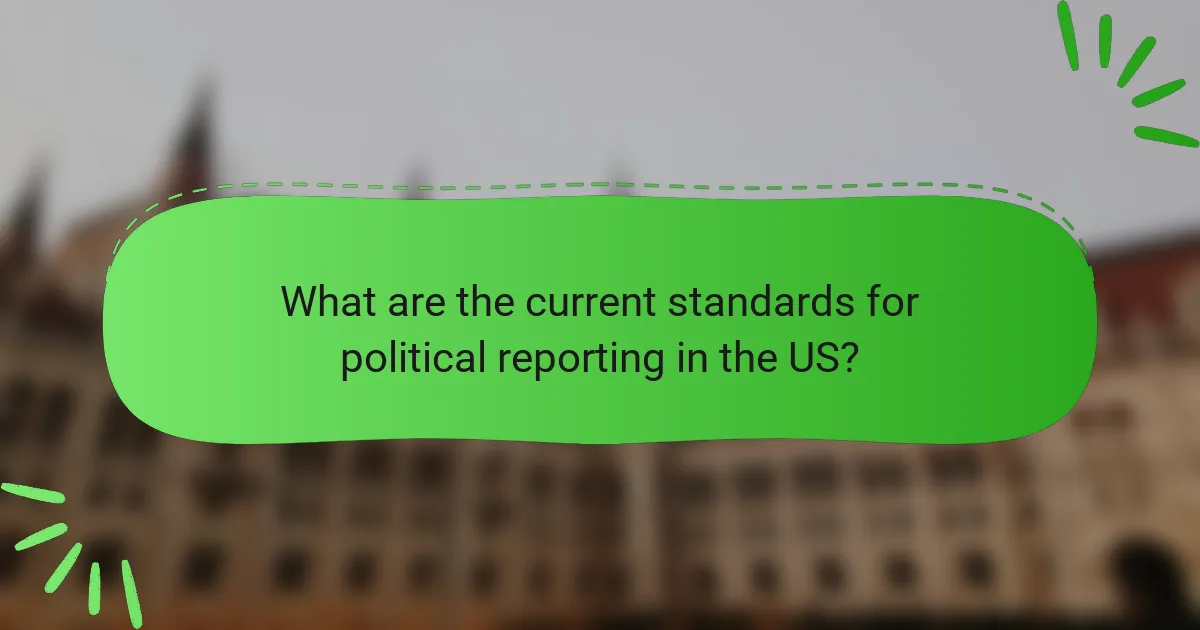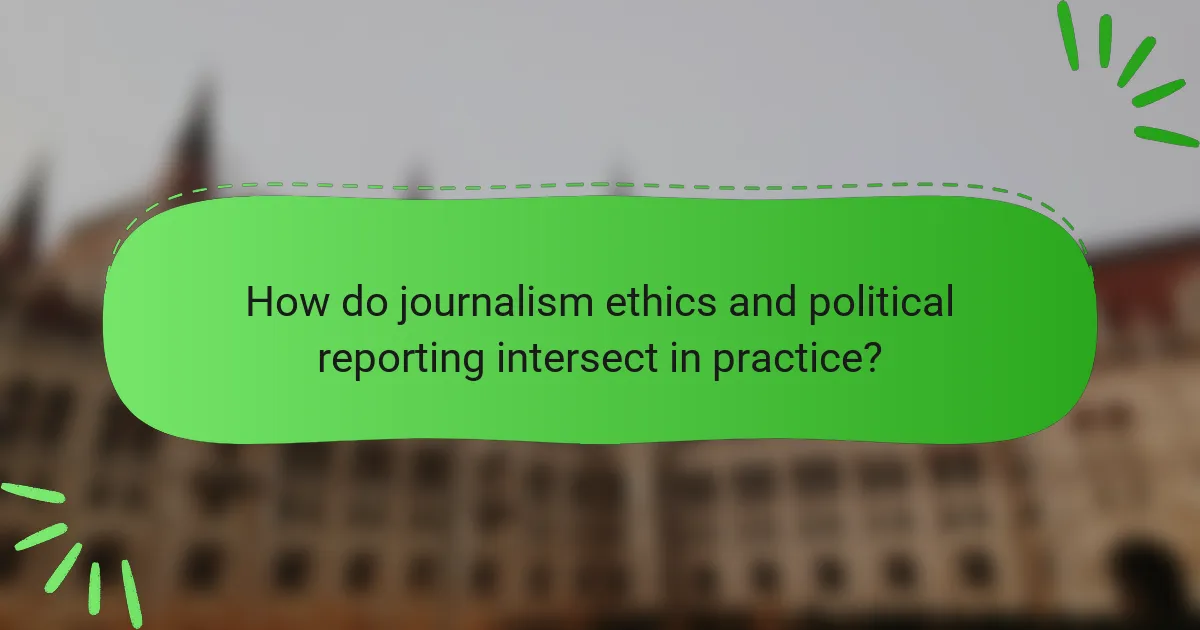The article explores the intersection of journalism ethics and political reporting in the United States, focusing on key principles such as accuracy, fairness, independence, and accountability. It highlights the importance of these ethical standards as outlined by the Society of Professional Journalists and their role in maintaining public trust. The discussion includes current practices in political reporting, emphasizing the necessity for fact verification, objectivity, and transparency. Additionally, the article addresses how adherence to ethical guidelines fosters responsible political discourse and enhances credibility in journalism.

What are the fundamental principles of journalism ethics?
The fundamental principles of journalism ethics include accuracy, fairness, independence, and accountability. Accuracy ensures that information is reported truthfully and verified. Fairness involves presenting all sides of a story without bias. Independence means journalists should avoid conflicts of interest that could compromise their integrity. Accountability requires journalists to take responsibility for their work and correct errors promptly. These principles are essential for maintaining public trust in the media. The Society of Professional Journalists outlines these ethical standards, emphasizing their importance in fostering credible journalism.
How do these principles apply to political reporting?
Journalism ethics principles apply to political reporting by ensuring accuracy, fairness, and accountability. These principles guide journalists to verify information before publication. They require balanced representation of differing viewpoints. Ethical political reporting aims to inform the public without bias. It holds political figures accountable for their actions. For instance, the Society of Professional Journalists emphasizes the importance of truth and transparency. Adhering to these principles fosters trust between the media and the public. This trust is crucial for a functioning democracy.
What ethical dilemmas do journalists face in political contexts?
Journalists face several ethical dilemmas in political contexts. One major dilemma is the conflict between objectivity and bias. Journalists must strive to report facts while grappling with personal beliefs. Another dilemma is the pressure to report quickly versus the need for accuracy. Fast-paced political news can lead to misinformation if not verified.
Additionally, journalists often encounter the challenge of sourcing information. They must balance transparency with the need to protect confidential sources. The potential for harm is another ethical concern. Reporting sensitive information can endanger individuals or communities.
Moreover, journalists may face ethical questions regarding sensationalism. The desire to attract audiences can lead to exaggeration or distortion of facts. Lastly, the influence of political affiliations can create dilemmas in maintaining impartiality. Journalists must navigate these complexities to uphold their ethical responsibilities.
How can journalists balance objectivity and advocacy in political reporting?
Journalists can balance objectivity and advocacy in political reporting by adhering to ethical standards and maintaining transparency. Objectivity requires presenting facts without bias. Advocacy involves supporting specific viewpoints or causes. Journalists should clearly differentiate between news reporting and opinion pieces. They can achieve this by labeling content appropriately. For instance, using “op-ed” for opinion articles signals advocacy. Additionally, journalists should fact-check and verify information before publication. This promotes credibility and trust. Research by the Pew Research Center shows that audiences value transparency in journalism. Clear separation of news and opinion helps maintain audience trust while allowing for advocacy.
Why is transparency important in journalism ethics?
Transparency is crucial in journalism ethics because it fosters trust between journalists and their audience. When journalists are transparent about their sources, methods, and potential biases, they enhance credibility. This trust is essential for a functioning democracy, as informed citizens rely on accurate information. Studies show that transparency can lead to higher audience engagement and loyalty. For example, the American Press Institute found that audiences are more likely to trust news organizations that are open about their reporting processes. Ultimately, transparency in journalism ethics serves as a foundation for accountability and integrity in the media.
What role does transparency play in building trust with the audience?
Transparency plays a crucial role in building trust with the audience. It allows the audience to understand the processes behind information dissemination. When journalists disclose their sources and methods, it enhances credibility. Audiences are more likely to trust information that is openly shared and explained. Studies show that transparency can lead to higher audience engagement. For instance, a 2020 Pew Research study found that 67% of Americans believe transparency in journalism is essential for trust. This demonstrates that transparency fosters a sense of accountability. Ultimately, clear communication and openness create stronger relationships between journalists and their audience.
How can journalists ensure transparency in their reporting processes?
Journalists can ensure transparency in their reporting processes by clearly disclosing their sources and methodologies. This practice builds trust with the audience. Journalists should explain how information was gathered. They must provide context for the data presented. Citing sources allows readers to verify claims. Transparency also includes acknowledging any potential biases. Journalists should clarify their affiliations and funding sources. This level of openness promotes accountability in the reporting process. Studies show that transparent reporting enhances public trust in journalism.

What are the current standards for political reporting in the US?
Current standards for political reporting in the US emphasize accuracy, fairness, and transparency. Journalists must verify facts before publication. They are required to provide context to avoid misrepresentation. Objectivity is crucial in presenting multiple viewpoints. Ethical guidelines discourage conflicts of interest and require disclosure of sources when necessary. The Society of Professional Journalists outlines these principles in its Code of Ethics. Adherence to these standards helps maintain public trust in the media. Compliance is monitored by various journalism organizations and peer reviews.
How do these standards differ from general journalism standards?
Political reporting standards prioritize transparency and accountability, differing from general journalism standards. Political reporting often requires disclosing sources and potential conflicts of interest more rigorously. This is crucial for maintaining public trust in political discourse. General journalism standards may allow for more anonymity to protect sources. Additionally, political reporting emphasizes accuracy in the context of public policy and governance. This contrasts with general journalism, which may focus more on entertainment or lifestyle topics. The heightened scrutiny in political journalism is necessary due to the implications of reporting on democratic processes. Such differences ensure that political reporting serves the public interest effectively.
What specific guidelines govern political reporting in the US?
Political reporting in the US is governed by guidelines established by various organizations and legal frameworks. The Society of Professional Journalists (SPJ) Code of Ethics emphasizes accuracy, fairness, and independence. Journalists are expected to seek truth and report it, minimizing harm and acting independently. Federal and state laws also regulate political reporting, including campaign finance laws that require disclosure of funding sources. The Federal Communications Commission (FCC) enforces regulations on political advertising and equal time provisions for candidates. These guidelines ensure accountability and ethical standards in political journalism.
How do these guidelines impact the coverage of political events?
These guidelines significantly shape the coverage of political events by establishing ethical standards for journalists. They promote accuracy, fairness, and impartiality in reporting. Adherence to these principles helps prevent misinformation and bias in political narratives. For instance, guidelines often require fact-checking and source verification. This process enhances the credibility of news reports. Furthermore, ethical guidelines encourage transparency about conflicts of interest. This transparency fosters trust between the media and the public. Overall, these guidelines ensure that political coverage is responsible and accountable.
What challenges do journalists face in adhering to these standards?
Journalists face several challenges in adhering to ethical standards. One major challenge is the pressure to produce timely news. Deadlines can compromise thorough fact-checking and ethical considerations. Additionally, the influence of political bias can affect reporting. Journalists may struggle to maintain objectivity amid polarized political environments. Resource limitations also pose a challenge. Many news organizations have cut staff, leading to increased workloads for remaining journalists. This can hinder their ability to investigate thoroughly. Furthermore, the rise of misinformation complicates adherence to standards. Journalists must navigate a landscape where false information spreads rapidly. Lastly, public scrutiny and backlash can deter journalists from reporting certain stories. This can create a chilling effect on free expression and ethical reporting.
How do external pressures influence journalistic integrity in political reporting?
External pressures significantly influence journalistic integrity in political reporting. These pressures can stem from various sources, including government entities, corporate sponsors, and public opinion. Journalists may face threats to their credibility when reporting on politically sensitive issues. For example, government officials may exert pressure to shape narratives or suppress unfavorable information.
Corporate interests can also impact the content and tone of political reporting. Media organizations reliant on advertising revenue may avoid critical coverage of major sponsors. Additionally, public opinion can create a climate of fear, leading journalists to self-censor to maintain audience approval.
Research shows that external pressures can lead to biased reporting, compromising the objectivity that is essential to journalistic integrity. A study by the Pew Research Center found that 70% of journalists believe that political pressures affect their reporting. This illustrates the pervasive influence of external factors on journalistic practices in the political realm.
What are the consequences of failing to meet these standards?
Failing to meet journalism standards can lead to significant consequences. These include loss of credibility among the audience. Credibility is essential for trust in journalism. Without it, media organizations may face declining readership and viewership. This decline can result in reduced advertising revenue. Additionally, journalists may face disciplinary actions from their employers. In severe cases, legal repercussions can arise from misinformation or defamation. According to a 2020 study by the Pew Research Center, 70% of Americans believe that news organizations should be held accountable for inaccuracies. This statistic underscores the importance of adhering to established ethical standards in journalism.

How do journalism ethics and political reporting intersect in practice?
Journalism ethics and political reporting intersect through the commitment to truthfulness and accountability. Ethical journalism requires accurate representation of facts, especially in political contexts. Reporters must verify information before publication to avoid misinformation. This practice is crucial during elections, where public opinion is heavily influenced by reporting. Transparency about sources enhances credibility and trust with the audience. Ethical guidelines also dictate the need for balance and fairness, ensuring multiple viewpoints are represented. The Society of Professional Journalists emphasizes these principles in its Code of Ethics. Adhering to these standards fosters a responsible political discourse in society.
What are some case studies that illustrate this intersection?
One case study illustrating the intersection of journalism ethics and US political reporting is the Watergate scandal. This event showcased the critical role of investigative journalism in holding political figures accountable. Journalists Bob Woodward and Carl Bernstein of The Washington Post uncovered the scandal through rigorous reporting and ethical standards. Their work led to the resignation of President Richard Nixon in 1974, highlighting the importance of ethical journalism in a democratic society.
Another significant case study is the coverage of the 2000 presidential election. Media outlets faced criticism for their reporting practices, particularly regarding the Florida vote count. The ethical dilemmas around accuracy and fairness were scrutinized. The aftermath raised questions about journalistic standards in political reporting and the impact of media on public perception.
A third case study is the reporting on the Trump-Russia investigation. Journalists faced ethical challenges in balancing national security with the public’s right to know. Coverage by major news organizations, including The New York Times and CNN, emphasized the importance of sourcing and verification. The investigation underscored the ethical responsibilities of journalists in politically charged environments.
These case studies illustrate how journalism ethics directly influence political reporting standards and practices in the US.
How have past political scandals shaped current ethical practices in journalism?
Past political scandals have significantly influenced current ethical practices in journalism. Scandals like Watergate and the Clinton-Lewinsky affair led to heightened scrutiny in reporting. Journalists now prioritize fact-checking and transparency to avoid misinformation. The Society of Professional Journalists updated its code of ethics in response to these events. This code emphasizes accountability and ethical decision-making. Furthermore, the rise of digital media has increased the demand for accuracy and credibility. As a result, news organizations implement stricter editorial standards. These adaptations aim to rebuild public trust in journalism after past failures.
What lessons can be learned from these case studies?
Case studies in journalism ethics reveal critical lessons about accountability and transparency. They emphasize the importance of fact-checking in political reporting. Ensuring accuracy builds trust with the audience. Case studies also highlight the consequences of biased reporting. This can lead to misinformation and public distrust. Ethical dilemmas often arise in political contexts, requiring journalists to navigate complex situations. They must balance the public’s right to know with potential harm. Lastly, these studies underscore the need for continuous ethical training for journalists. This helps maintain high standards in reporting practices.
What best practices should journalists follow in political reporting?
Journalists should prioritize accuracy, fairness, and transparency in political reporting. They must fact-check all information before publication. This includes verifying sources and data. Journalists should strive for balanced reporting by presenting multiple viewpoints. They must disclose any potential conflicts of interest. Maintaining objectivity is crucial to avoid bias in coverage. Journalists should adhere to ethical guidelines set by professional organizations. Engaging with the audience through clear and accessible language enhances understanding. These practices ensure credibility and trustworthiness in political journalism.
How can journalists effectively fact-check information in political stories?
Journalists can effectively fact-check information in political stories by utilizing multiple reliable sources. They should verify claims made by politicians against reputable databases and fact-checking organizations. Cross-referencing information helps identify inconsistencies and confirm accuracy. Journalists must also consult primary sources, such as official documents and records. Engaging with experts in relevant fields can provide additional context and clarity. Utilizing technology, like fact-checking software, can streamline the verification process. According to the Poynter Institute, thorough research and skepticism are essential in maintaining journalistic integrity. Fact-checking enhances credibility and informs the public accurately.
What strategies can journalists use to maintain impartiality in their reporting?
Journalists can maintain impartiality in their reporting by adhering to several key strategies. First, they should verify facts from multiple sources before publication. This practice minimizes bias and ensures accuracy. Second, journalists must disclose any conflicts of interest. Transparency about personal connections to a story fosters trust. Third, they can employ neutral language in their writing. Avoiding emotionally charged words helps present information objectively. Fourth, journalists should strive to represent diverse viewpoints. Including multiple perspectives enriches the narrative and prevents favoritism. Lastly, ongoing training in ethics and bias awareness is crucial. Continuous education reinforces the commitment to impartial reporting. These strategies collectively promote fairness and integrity in journalism.
How can emerging technologies influence journalism ethics in political reporting?
Emerging technologies can significantly influence journalism ethics in political reporting by altering how information is gathered, disseminated, and consumed. Technologies like artificial intelligence and machine learning can enhance data analysis, enabling journalists to uncover patterns in political behavior. However, these technologies also raise ethical concerns about bias and misinformation. For example, algorithms may inadvertently promote biased narratives if trained on skewed data. Additionally, the rise of social media platforms has transformed news distribution, creating challenges in verifying sources and maintaining credibility. The speed of information sharing can lead to the spread of false information, complicating ethical standards. A study by the Pew Research Center found that 64% of Americans believe fabricated news stories cause confusion about basic facts. Thus, while emerging technologies can improve political reporting, they also necessitate a reevaluation of ethical guidelines to ensure accuracy and accountability.
What role do social media platforms play in shaping public perception of political news?
Social media platforms significantly influence public perception of political news. They serve as primary channels for news dissemination. Users often rely on these platforms for real-time updates. Algorithms curate content based on user preferences, amplifying certain narratives. This can lead to echo chambers, where users only encounter familiar viewpoints. Research indicates that social media can distort perceptions of political events. A study by the Pew Research Center found that 62% of Americans get news from social media. This reliance shapes opinions and can impact voter behavior. Misinformation spreads rapidly on these platforms, further complicating public understanding.
How can journalists leverage technology while upholding ethical standards?
Journalists can leverage technology by utilizing digital tools for fact-checking and research. These tools enhance accuracy and reliability in reporting. For instance, platforms like FactCheck.org provide real-time verification of claims made by public figures. Journalists can also use social media analytics to gauge public sentiment while ensuring transparency in sourcing. Ethical standards demand that journalists disclose their methods and avoid conflicts of interest. Adopting encryption tools can protect sensitive information and sources, which is crucial for maintaining trust. Overall, technology can streamline processes while reinforcing ethical commitments in journalism.
The main entity of the article is the intersection of journalism ethics and US political reporting, focusing on the standards and practices that govern this field. The article outlines fundamental principles of journalism ethics, including accuracy, fairness, independence, and accountability, and how these principles apply specifically to political reporting. It discusses ethical dilemmas faced by journalists, the importance of transparency in building trust with the audience, and current standards that guide political reporting in the US. Additionally, the article examines the challenges journalists encounter in adhering to these standards and the influence of emerging technologies and social media on journalistic integrity and public perception.